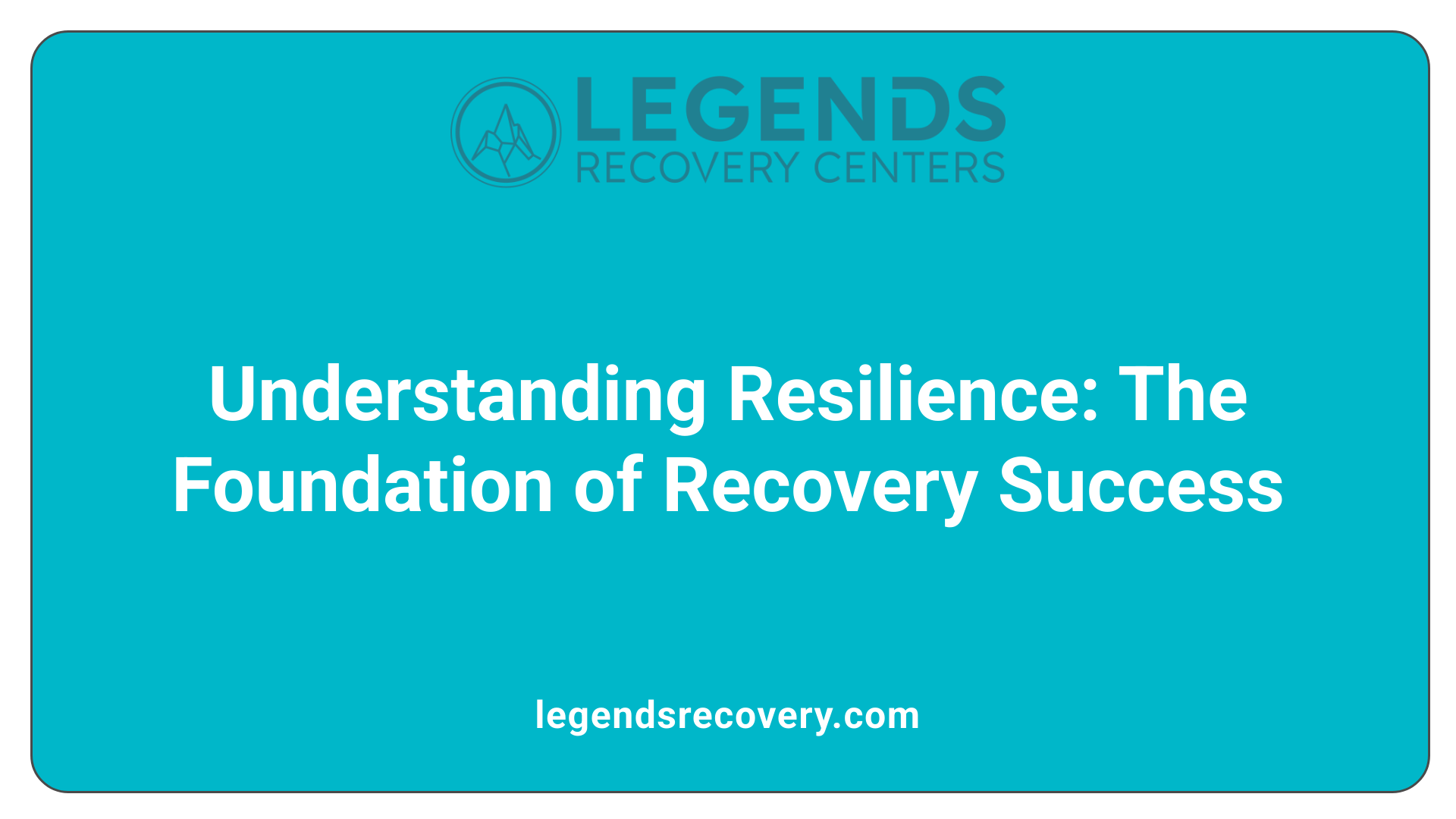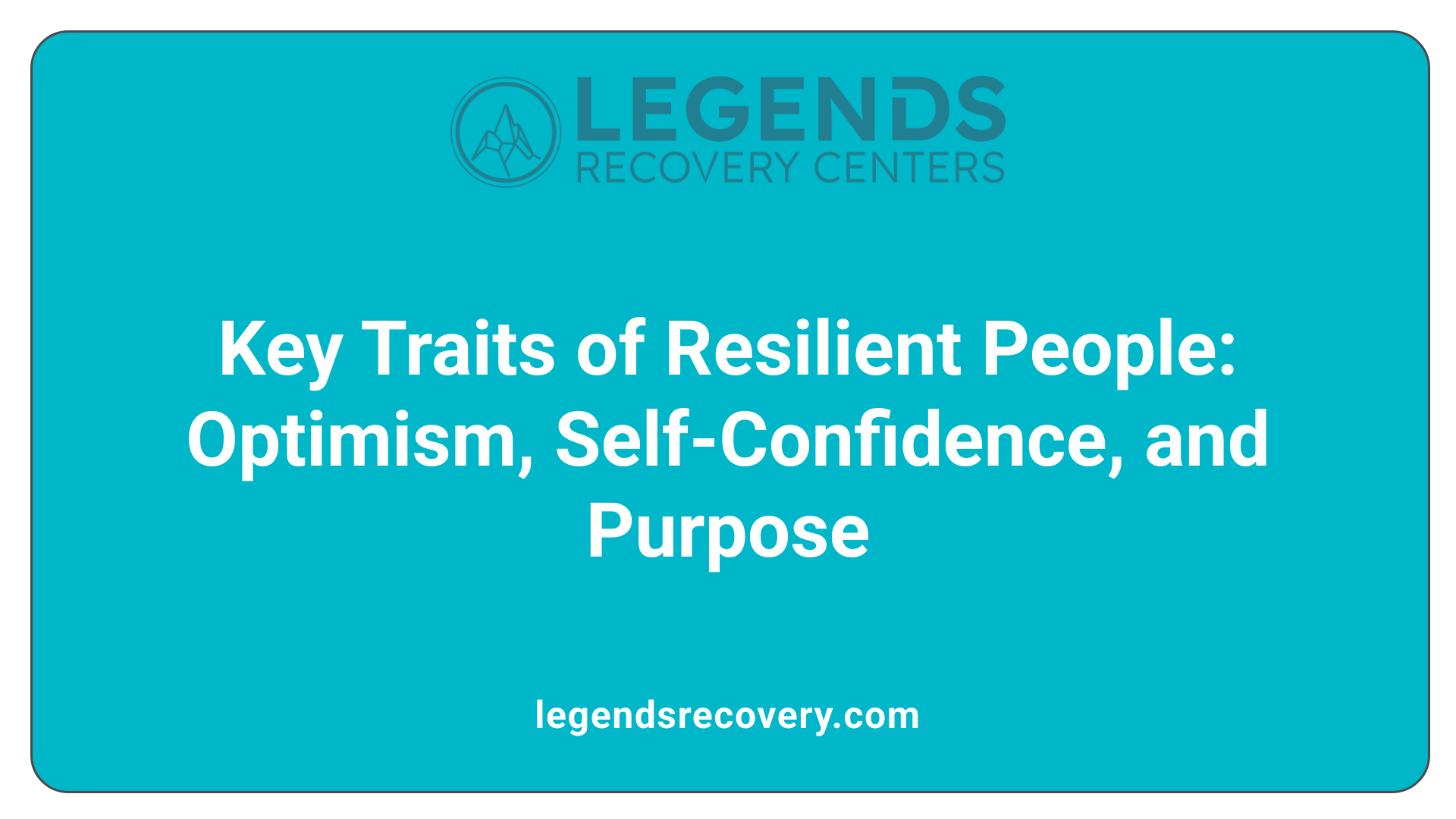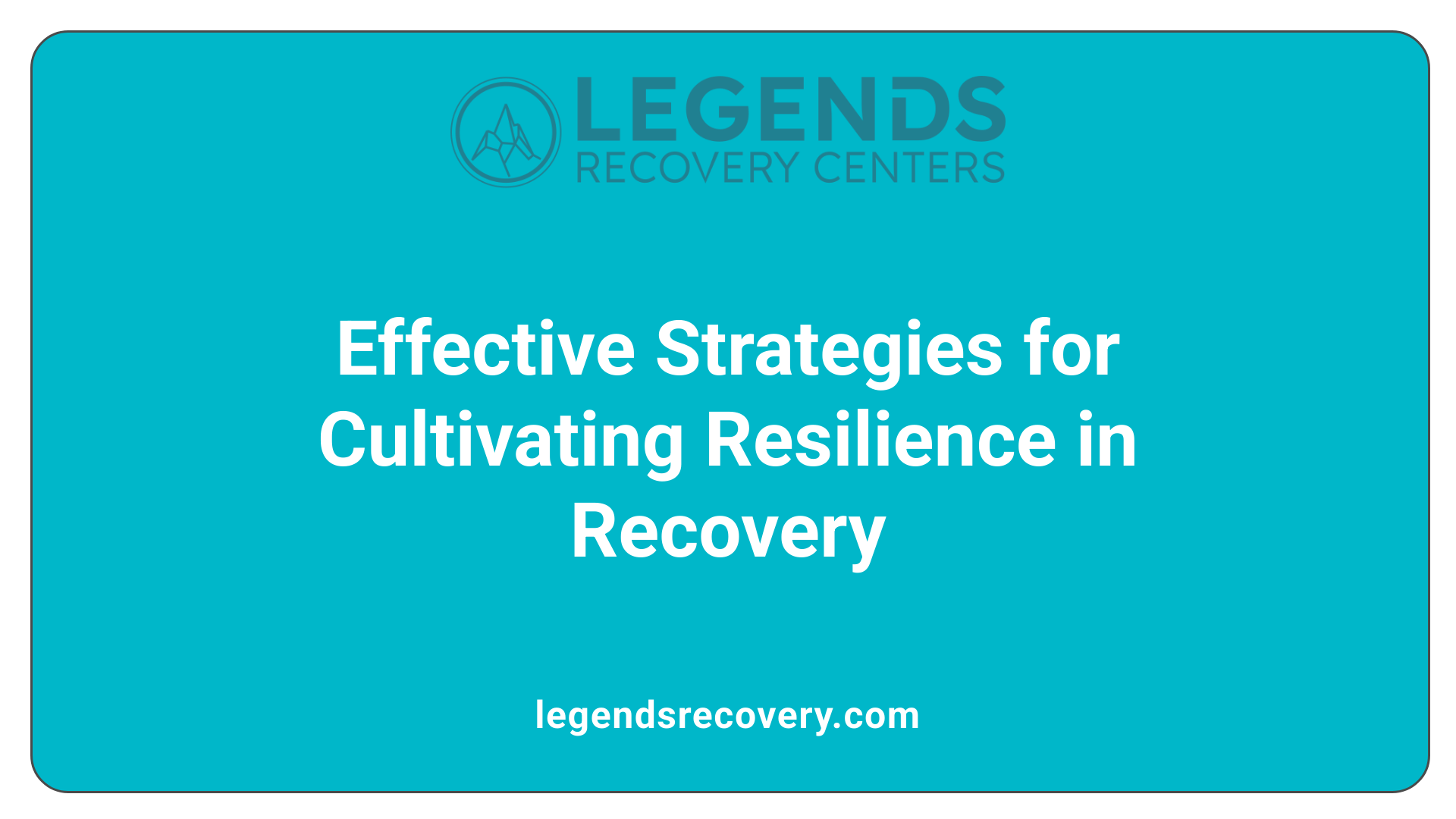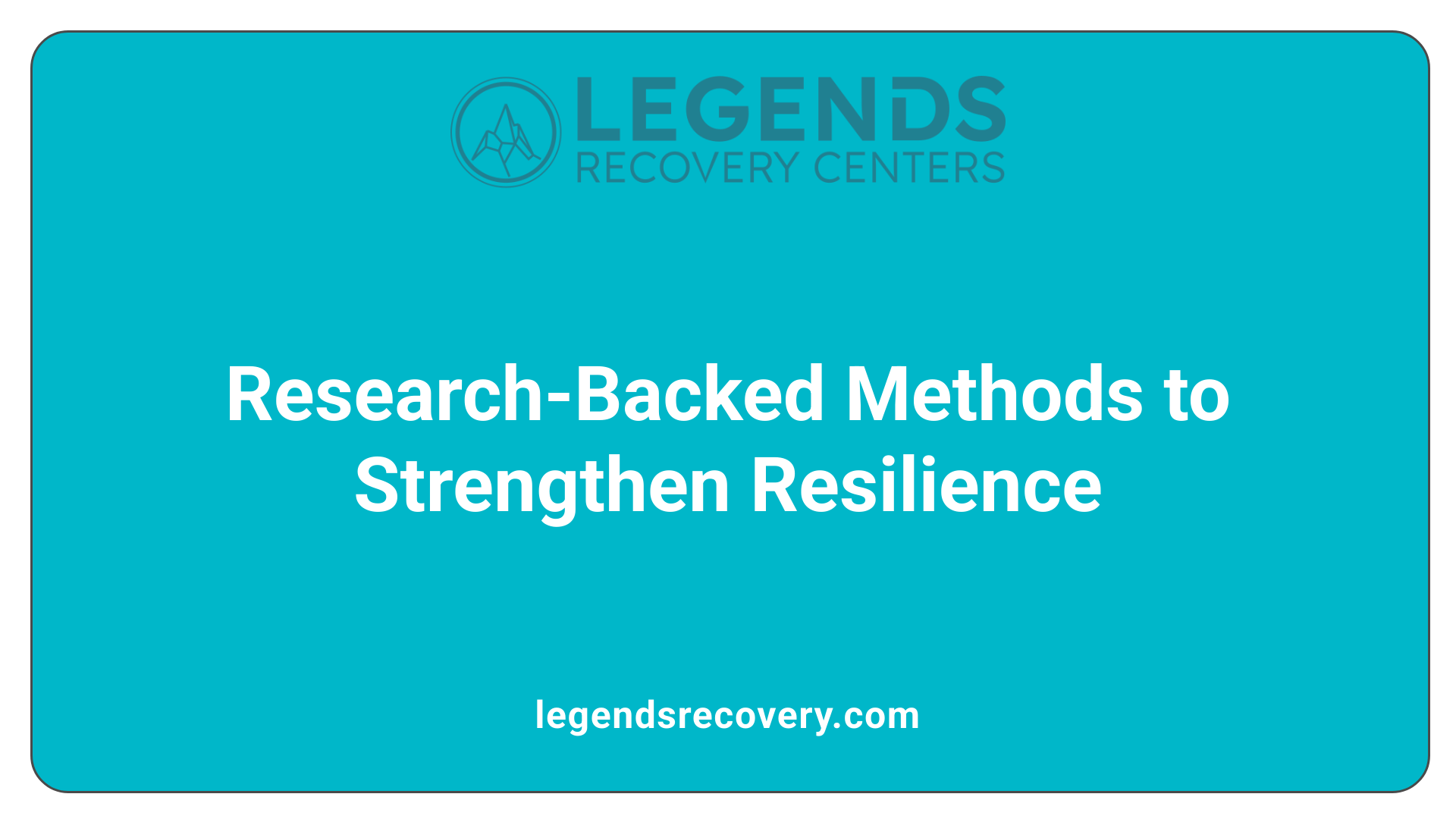Strengthening Your Inner Armor for Lasting Sobriety

Resilience is a vital component in the journey to overcome addiction. Derived from Latin 'resilio,' meaning to bounce back or rebound, resilience signifies an individual's ability to recover from setbacks, adapt to challenges, and emerge stronger. In the context of addiction recovery, developing resilience equips individuals with the psychological strength needed to handle cravings, manage stressors, and prevent relapse. Recognizing that resilience is a skill that can be cultivated through intentional actions and strategies lays the foundation for sustained sobriety and overall well-being.

Resilience is defined as the ability to adapt to difficult circumstances or life events. It enables individuals to bounce back from setbacks, cope with stress, and develop an inner strength that helps them manage adversity effectively.
This capacity is not just a fixed trait but a set of skills and strategies that can be cultivated over time. Developing resilience involves practices such as maintaining a positive outlook, practicing self-care, building supportive relationships, and learning stress management techniques like mindfulness or meditation.
In the context of addiction recovery, resilience plays a vital role. It helps individuals cope with cravings, manage emotional triggers, and stay motivated through the healing process.
Building resilience can empower recovering individuals to navigate through the challenges of withdrawal, emotional turmoil, and unforeseen setbacks. It also promotes psychological well-being by fostering optimism, emotional regulation, and problem-solving skills.
Research indicates that higher resilience correlates with lower levels of substance use, even among those with histories of childhood abuse or trauma. For example, a study examining stress responsivity found that resilience buffered against the adverse effects of childhood trauma, decreasing hazardous alcohol use.
Resilience is crucial for maintaining sobriety over the long term. It helps people develop adaptive responses to common recovery hurdles, such as dealing with social pressures or emotional lows.
Strategies such as building social support networks, practicing self-care, and framing challenges as opportunities for growth contribute to resilience. When challenges are viewed through a resilient lens, they become opportunities for growth rather than insurmountable obstacles.
Building emotional resilience involves recognizing and managing emotions, developing healthy coping mechanisms, and seeking professional support when needed. Techniques like mindfulness, positive affirmations, and goal-setting further reinforce resilience.
In sum, resilience acts as a protective factor that sustains recovery by reducing the likelihood of relapse, enhancing mental health, and promoting a positive outlook on life despite difficulties.

Resilient individuals are marked by their ability to accept reality, believe that life has inherent meaning, and adapt proactively when faced with difficulties. These traits are fundamental for bouncing back after setbacks. In addition, qualities like optimism, emotional regulation, self-confidence, and a strong sense of purpose play a vital role in their resilience.
Optimism drives a positive outlook that encourages individuals to perceive challenges as opportunities for personal growth rather than insurmountable obstacles. Emotional regulation empowers them to manage stress effectively and maintain emotional balance, which is crucial for resilience. Self-confidence bolsters their belief in their capacity to handle adversity, while a purposeful life provides motivation and direction during tough times.
Optimism helps individuals maintain hope and motivation, making it easier to recover from setbacks and persist in recovery efforts. Managing emotions through emotional regulation minimizes the impact of stress, trauma, or cravings, fostering mental clarity and stability.
Self-awareness serves as a foundational skill, allowing individuals to recognize their emotional states, acknowledge vulnerabilities, and develop tailored coping mechanisms. Together, these traits create a resilient outlook that supports mental and emotional toughness, enabling individuals to leverage setbacks as opportunities for learning and growth.
Self-confidence instills a belief in oneself that is essential for navigating recovery’s hurdles. When individuals trust their abilities, they are more likely to confront challenges head-on and persevere.
Having a clear sense of purpose acts as an anchor, providing motivation to stay committed to sobriety and personal development. It helps individuals focus on their goals, whether rebuilding relationships, pursuing education, or establishing new healthy routines. This sense of meaning sustains resilience over the long term and helps individuals thrive despite difficulties.
| Trait | Contribution to Resilience | Additional Notes |
|---|---|---|
| Optimism | Promotes a positive perspective on setbacks | Helps reframe negative experiences as growth opportunities |
| Emotional regulation | Stabilizes mood, reduces stress impact | Essential for managing cravings and triggers |
| Self-awareness | Recognizes emotional and behavioral patterns | Facilitates personalized coping strategies |
| Self-confidence | Fosters proactive problem-solving | Encourages persistence during recovery |
| Purpose | Provides motivation and direction | Maintains focus on long-term goals |
Building resilience isn’t solely about innate traits; it involves actively cultivating these qualities through practices like mindfulness, self-reflection, setting achievable goals, and fostering supportive relationships. The combination of these traits and skills creates a resilient mindset essential for long-lasting recovery.
 Developing resilience is an essential part of recovery, especially in overcoming substance use disorder and related challenges. One of the most effective strategies involves learning from past experiences. Reflecting on previous setbacks and understanding the lessons they offer can strengthen problem-solving skills and mental toughness. This process encourages individuals to view difficulties as opportunities to grow rather than insurmountable obstacles.
Developing resilience is an essential part of recovery, especially in overcoming substance use disorder and related challenges. One of the most effective strategies involves learning from past experiences. Reflecting on previous setbacks and understanding the lessons they offer can strengthen problem-solving skills and mental toughness. This process encourages individuals to view difficulties as opportunities to grow rather than insurmountable obstacles.
Accepting inevitable change is another vital component. Change is a natural part of life and recovery. Embracing these transitions helps individuals adapt more smoothly and reduces feelings of resistance or frustration. Acceptance allows for a focus on what can be controlled and encourages proactive adjustment to new circumstances.
Having a strong support system significantly enhances resilience. Support networks—comprising family, friends, support groups, and mental health professionals—offer emotional comfort and practical guidance during tough times. These relationships foster a sense of belonging and safety, boosting confidence and resilience. Support systems not only provide encouragement but also assist in developing healthy coping strategies and maintaining motivation.
Effective resilience-building strategies also include engaging in activities that promote well-being, such as exercise, mindfulness, and hobbies. Prioritizing self-care—through proper nutrition, sufficient sleep, and relaxation—supports mental and physical health, creating a solid foundation for resilience.
Seeking professional support when necessary is equally important. Therapists and counselors can help develop tailored coping strategies, address underlying emotional issues, and reinforce resilience skills.
| Strategy | Purpose | Examples |
|---|---|---|
| Learning from past | Strengthen problem-solving and adaptability | Reflection, journaling, therapy sessions |
| Accepting change | Reduce resistance, foster adaptability | Mindfulness, therapy, flexible planning |
| Support system | Provide emotional backup and practical aid | Family, friends, support groups, mentors |
| Self-care | Maintain overall well-being | Exercise, healthy eating, sleep routines |
| Professional help | Gain tailored guidance and emotional support | Counseling, medication, coaching |
Building resilience requires ongoing effort, but the benefits—such as better stress management, improved emotional health, and reduced relapse risk—are well worth the commitment. By integrating these strategies into daily life, individuals can not only enhance their capacity to recover but also foster long-term well-being.
Resilience is not only shaped by our experiences and environment but also by biological influences. Genetic variations can significantly impact how individuals respond to stress and recover from adversity. Studies point to specific genes related to the stress response systems, such as those involved in the hypothalamic–pituitary–adrenal (HPA) axis, which regulates hormones like cortisol that are crucial during stress.
Other genes linked to serotonin transport influence mood regulation and emotional stability, playing a role in one's resilience. Additionally, neuropeptides like neuropeptide Y (NPY) and brain-derived neurotrophic factor (BDNF) are involved in promoting resilience by supporting neural plasticity and emotional regulation. Variability in these genes can determine how well a person copes with stressful situations and adapts over time.
On the psychological side, resilience is heavily influenced by psychosocial factors. Optimism and positive emotional experiences serve as mental buffers, helping individuals see challenges as opportunities rather than insurmountable obstacles. These traits foster a growth mindset, where setbacks are viewed as temporary and manageable.
Effective coping strategies, such as mindfulness, cognitive reappraisal, and seeking social support, also play crucial roles. Social support, whether from family, friends, or community groups, provides a sense of security and belonging, which boosts emotional resilience. Together, these psychological attributes help individuals withstand stress, recover from setbacks, and maintain mental well-being even in difficult circumstances.

Research indicates that resilience plays a crucial role in maintaining sobriety. A study examining 60 individuals with substance use disorder found that the average resilience score was high (75 out of a possible higher score), showing that most abstinent individuals possess a moderate to high level of resilience. Importantly, resilience was positively linked to perceived social support from family and significant others, emphasizing the importance of support networks.
Moreover, higher resilience correlated with better educational attainment and income, highlighting socio-economic factors' influence on resilience levels. Among participants, 80% had a history of abstinence, with 40% maintaining sobriety for over three months. These findings suggest that resilience not only helps individuals bounce back after setbacks but also supports long-term abstinence.
A broader study involving over 2,000 urban adults reinforced these insights. It found that higher resilience scores associated with lower alcohol and drug use, even among those with histories of childhood abuse and trauma. Resilience buffered the effects of early trauma, decreasing hazardous alcohol consumption. Overall, resilience acts as a protective factor, helping individuals recover from adversity and sustain their recovery journey.
Building resilience is a dynamic process that can be cultivated through various evidence-based strategies. Cognitive-behavioral therapy (CBT) is a prominent approach that equips individuals with tools to manage emotions, reframe negative thoughts, and develop healthier coping mechanisms.
Mindfulness-based stress reduction (MBSR) practices, such as meditation and breathing exercises, are also effective in enhancing emotional regulation and reducing stress, which are vital in resisting relapse.
Participation in support groups like Alcoholics Anonymous and Narcotics Anonymous provides social resources, emotional encouragement, and shared experiences that foster resilience. These communities offer a sense of belonging and accountability, which are essential components of a resilient recovery.
Other techniques include cultivating a positive outlook through gratitude and self-affirmations, setting realistic goals, and engaging in self-care activities like regular exercise, balanced nutrition, and adequate sleep. Developing emotional intelligence—understanding and managing one's emotions—further enhances resilience.
Support from mental health professionals, including therapists and recovery coaches, can guide individuals in implementing these strategies. The combination of behavioral therapies, community support, and personal growth practices creates a robust foundation for resilience, ultimately supporting long-term recovery.
| Strategy | Description | Benefits |
|---|---|---|
| Cognitive-behavioral therapy | Techniques to reframe negative thoughts and improve coping | Reduces relapse risk, improves emotional control |
| Mindfulness practices | Meditation, deep breathing, relaxation techniques | Lowers stress, enhances emotional resilience |
| Support groups | Peer-led recovery communities | Provides social support, shared experiences |
| Self-care practices | Exercise, nutrition, sleep hygiene | Enhances physical and mental health |
| Emotional intelligence training | Recognizing and managing emotions | Promotes healthy relationships and self-awareness |
Building resilience also involves connecting with professional resources. Therapy, support groups, and community programs offer ongoing support and skills training. These strategies collectively help individuals handle triggers, setbacks, and adversity.
In summary, resilience isn't innate but can be developed with consistent effort. Combining evidence-based therapies with social support and self-care practices forms an effective approach to strengthening resilience, thereby supporting lasting recovery from addiction.
Building resilience during recovery involves adopting specific habits and techniques that strengthen emotional and mental strength. Practices such as mindfulness and meditation help individuals recognize emotional states and triggers, providing clarity and emotional regulation. Journaling allows for reflection on progress, setbacks, and lessons learned, fostering self-awareness.
Engaging in hobbies and physical activities boosts mood, reduces stress, and promotes a sense of achievement. Maintaining a balanced diet and regular exercise supports overall well-being, contributing to better stress management and resilience. Importantly, seeking social support from friends, family, or support groups creates a safety net, offering encouragement and perspective during challenging times.
These practices work together to develop a resilient mindset by improving emotional regulation, reducing stress, and enhancing mental clarity.
Setting realistic and achievable goals provides motivation and a clear sense of direction, helping individuals focus on manageable steps rather than overwhelming challenges. Breaking down long-term objectives into smaller, attainable tasks fosters a sense of progress and confidence.
Positive self-talk plays a crucial role by reframing setbacks or difficulties as opportunities for growth. It cultivates a resilient mindset by encouraging optimism and self-compassion. For example, replacing thoughts like "I can't handle this" with "I can find a way through this" reinforces resilience.
Together, goal-setting and positive self-talk create a supportive internal environment that promotes perseverance, enhances self-esteem, and reinforces the ability to navigate recovery's ups and downs.
| Tool or Habit | Purpose | How It Builds Resilience |
|---|---|---|
| Mindfulness & Meditation | Emotional regulation, stress reduction | Helps recognize emotional triggers and stay centered |
| Journaling | Self-awareness, reflection | Clarifies thoughts, tracks progress, and lessons learned |
| Hobbies & Exercise | Mood enhancement, stress relief | Promotes physical health and mental well-being |
| Balanced Diet & Sleep | Overall health maintenance | Provides energy and reduces irritability |
| Social Support | Encouragement, perspective | Builds a safety net and reduces feelings of isolation |
| Goal-setting | Motivation, focus | Creates achievable steps, fosters confidence |
| Positive Self-talk | Optimism, resilience | Reframes challenges, boosts self-esteem |
Building resilience is an ongoing effort. Incorporating these practical tools and habits can help sustain sobriety, navigate setbacks effectively, and support long-term recovery.
 Resilience, derived from the Latin word 'resilio,' meaning to jump or bounce back, is an essential trait that supports individuals through life's challenges. Building resilience is particularly crucial in the context of addiction recovery, as it equips individuals with the ability to adapt, recover, and thrive despite setbacks.
Resilience, derived from the Latin word 'resilio,' meaning to jump or bounce back, is an essential trait that supports individuals through life's challenges. Building resilience is particularly crucial in the context of addiction recovery, as it equips individuals with the ability to adapt, recover, and thrive despite setbacks.
One of the primary mental health benefits of resilience is its capacity to reduce the impact of stress. Resilient individuals are better at managing stress, which decreases the likelihood of developing anxiety or depression. They tend to maintain emotional stability, allowing them to handle emotional upheavals more effectively during recovery. Practices such as self-care routines, mindfulness exercises, and seeking social support help in cultivating this emotional strength.
Beyond mental health, resilience significantly enhances overall well-being. It fosters a sense of purpose by encouraging individuals to set achievable goals and find meaning in their recovery journey. Strong relationships are also a byproduct of resilience, as it promotes positive social interactions and a supportive network, which are critical for sustained sobriety. Additionally, resilient people develop better coping strategies, enabling them to navigate life's stressors with confidence.
Physically, resilience contributes to health and lower stress levels. Engaging in regular physical activities, maintaining good nutrition, and practicing stress reduction techniques like meditation contribute to improved physical health. This holistic approach ensures that both mind and body are resilient, enhancing the quality of life.
The combined effect of mental, emotional, and physical benefits makes resilience a foundational element for long-term well-being. It empowers individuals to overcome adversity, sustain healthy relationships, and enjoy a balanced life. Continued practice of resilience skills—such as emotional regulation, problem-solving, and positive thinking—can lead to more fulfilling and sustainable recovery outcomes.
| Benefit Area | Specific Impact | How Resilience Contributes |
|---|---|---|
| Mental health | Reduces anxiety and depression | Builds emotional stability and stress management skills |
| Overall well-being | Sense of purpose and stronger relationships | Encourages goal-setting, social support, and personal growth |
| Physical health | Improved health and less stress | Promotes regular exercise, healthy habits, and emotional regulation |
Understanding these interconnected benefits underscores the importance of resilience. Developing this trait can lead to a healthier, more meaningful life—helping individuals bounce back from adversity and thrive in recovery and beyond.
Building resilience is a dynamic, ongoing process that empowers individuals to navigate the complexities of recovery. By developing core traits such as optimism, emotional regulation, and purpose, and engaging in evidence-based strategies like social connection, self-care, and mindfulness, individuals can strengthen their capacity to bounce back from setbacks. Recognizing the biological, psychological, and social factors influencing resilience allows for more targeted interventions, leading to sustainable sobriety and a healthier, more fulfilled life. Embracing resilience not only supports long-term recovery but also enriches overall mental, emotional, and physical well-being, making it a cornerstone of effective addiction management.